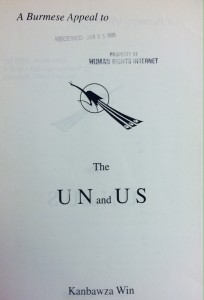–Matt Jones is a PhD candidate in the English department at the University of Connecticut. His work focuses on post-Enlightenment discourse in 18th– and 19th-century British literature. He has contributed to the processing and description of the Laurie S. Wiseberg and Harry Scoble Human Rights Internet and contributes research commentary on the collection to the Human Rights Archives Blog.
A lingering feeling of hopelessness permeated the old and young villagers of northern Burma under the SLORC – State Law and Order Restoration Council – regime of the 1980s and 1990s. The SLORC did not discriminate based on age, nor did the poor living conditions that became perpetuated under them. In interviews conducted with local children by Project Maje along the Burma – China border in 1991, multiple interviewees reported having already contracted malaria, theft of livestock by the Burmese government, and the early death of siblings. Nearly all of the children reported that fleeing from government forces brought them to the villages they now inhabit. A separate set of interviews with adults in the area revealed what treatment the children had to look forward to should they make it to adulthood. Adult interviewees related experiences of forced labor by the SLORC forces (called “portering”), SLORC agents requiring money or goods from traders on their way to market, and the torture of those too enfeebled to participate in forced labor. Each interview ended with the question of whether there was any hope for the future: the general answer was “no” with an occasional nod toward the desire for a true democracy. Continue reading

